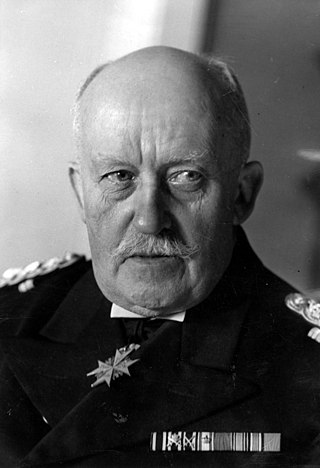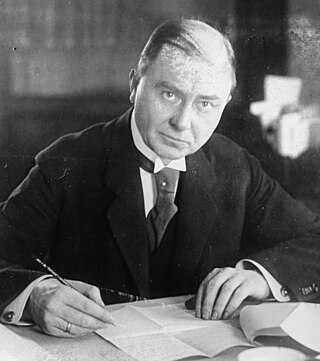
Julius Lippert was a German Nazi Party politician who served as the Staatskommissar for Berlin from 1933 to 1937 and as its Oberbürgermeister and Stadtspräsident from 1937 to 1940.

Heinz Tietjen was a German conductor and music producer born in Tangier, Morocco.

Adolf von Trotha was a German admiral in the Kaiserliche Marine. After the German revolution he briefly served as the first Chef der Admiralität, which replaced the imperial Reichsmarineamt. After supporting the Kapp-Lüttwitz Putsch of March 1920 he resigned his post. He later held several political and maritime posts in the Third Reich.

Karl Litzmann was a German World War I general and later Nazi Party member and politician.

Hermann Muhs was a German lawyer and Nazi Party politician who served as State Secretary and leader of the Reich Ministry for Church Affairs in Nazi Germany.

Karl Jarres was a German lawyer and politician of the German People's Party during the Weimar Republic. From 1923 to 1924, he was the minister of the Interior and vice-chancellor of Germany. Jarres was also the long-serving mayor of Duisburg from 1914 to 1933. After the Nazis deposed him, he started a career in industry.
Rudolf Brinkmann was a German economist and banker who rose to become a State Secretary in the Reich and Prussian Ministry of Economics and the Vice President of the Reichsbank in Nazi Germany. After only about a year in office, he had a nervous breakdown, was hospitalized for a severe psychiatric condition and relieved of his posts.
Gustav Hermann William August Koenigs was a German lawyer and State Secretary of Transport during the Weimar period and the Third Reich. The conspirators of the 20 July plot planned for him to become Reich Transport Minister had the coup d'état succeeded. He was arrested and released by the Gestapo and died in an airstrike toward the end of the Second World War.

Karl-Siegmund Hermann-Julius Litzmann was a Nazi German politician and SA-Obergruppenführer who commanded SA Equestrian troops and training. He also served as the Generalkommissar during the German occupation of Estonia in the Reichskommissariat Ostland from December 1941 to September 1944, and died under unexplained circumstances after the close of the Second World War in Europe.

The Prussian State Councilof Nazi Germany was an advisory body to the Prussian minister president from 1933 to 1945. It was the successor to the Weimar Republic body of the same name that represented the interests of Prussia's provinces in the legislative process. In Nazi Germany its members were either appointed by Prussian minister president Hermann Göring or were members as a result of their official positions in the state of Prussia. The Council met only six times and ceased to exist with the end of Nazi rule in 1945.
Bruno Wilhelm Heinrich Claußen was a German lawyer and civil servant who was the Prussian State Secretary for Economics and Labor in the first year of the Third Reich. After leaving public service, he became a successful business executive. He went missing during the final days of the Second World War.
Carl Heinrich Gustav Julius von Halfern was a German administrative lawyer. He was the district administrator of the Saarbrücken district (1916–19), the Regional President of Hildesheim (1922–27) and of Stettin (1927–30) and Oberpräsident of the Prussian Province of Pomerania (1930–33). A member of the German People's Party, he was removed as Oberpräsident shortly after the Nazi Party came into power.
Ernst Brandes was a German lawyer, estate manager and politician. During the Weimar Republic he was an influential agricultural administrator at the state and national levels. After the Nazi Party came to power, he was removed from his administrative positions.
Gustav Wagemann was a German lawyer and judge who worked in the Prussian Ministry of Justice under the German Empire, the Weimar Republic and Nazi Germany. He died in an airplane accident in December 1933.

Wilhelm Heinrich Börger was a German Nazi Party functionary and SS-Brigadeführer. He held several administrative positions, including as a Trustee of Labour and a Ministerial Director in the Reich Ministry of Labor. He also sat as a member of the Reichstag and the Prussian State Council. Following the defeat of Nazi Germany in the Second World War, he was interned for three years and released.

Georg Ferdinand Philipp Maria von Detten was a German army officer, Nazi Party politician and SA-Gruppenführer. He was extrajudicially murdered in Adolf Hitler's purge of the SA, known as the Night of the Long Knives.
Gustav Adolf Karl Joachim Rüdiger Graf von der Goltz was a German lawyer and Nazi Party member who, in the years before they came to power, defended many prominent Nazis, including Joseph Goebbels. He was also a member of the Reichstag and the Prussian State Council.
Rudolf Jakob Schmeer was a German Nazi Party politician. He held a number of Party and government positions during the Third Reich, and worked very closely with high ranking Nazis such as Robert Ley, Hermann Göring, Walther Funk and Albert Speer.
Siegfried Seidel-Dittmarsch was a German Nazi Party politician and SS-Gruppenführer. He was a member of the Reichstag and headed the SS central leadership staff that was the precursor of the SS Main Office.










